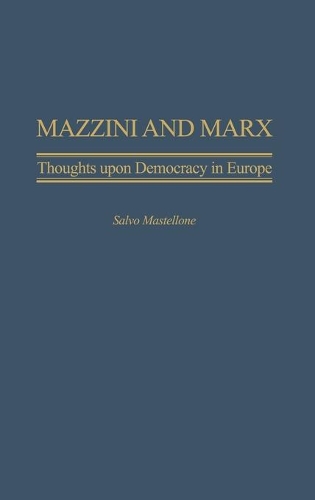
Mazzini and Marx: Thoughts Upon Democracy in Europe
(Hardback)
Publishing Details
Mazzini and Marx: Thoughts Upon Democracy in Europe
By (Author) Salvo Mastellone
Bloomsbury Publishing PLC
Praeger Publishers Inc
30th October 2003
United States
Classifications
General
Non Fiction
321.8094
Physical Properties
Hardback
232
Width 156mm, Height 235mm
482g
Description
Between August 1846 and April 1847, Guiseppe Mazzini, in London exile, published six articles in English in the People's Journal, the last of which was on Communism. With these articles, which became known in his native country in an 1852 Italian reworking, Mazzini powerfully inserted himself into the debate on the nature of democracy, alongside the most illustrious intellectuals of the time, Tocqueville, Blanc, Cabet, and Proudon. In two of his pieces, Mazzini answered the democratic communists-the Fraternal Democrats-who in 1847 invited the twenty-eight year old Karl Marx to London to rebut Mazzini's perceptive criticisms of communism and to explore a new possible elaboration of the ideology. Mastellone confronts the English text of Mazzini with the German text of Marx and traces an almost forgotten theoretical contest that has been ignored, but remains crucial for an understanding of two fundamental movements of the modern world: communism and democracy.
Reviews
It is hard to imagine a more authoritative craftsman; Mastellone's painstaking labors offer a highly rewarding examination....In the end, Mastellone suggests that the issues raised in Mazzini's assessment remain crucial for an understanding of fundamental movements of the modern world--nationalism, communism, and democracy. Whether one agrees or disagrees with Mastellone, the seriousness of his book's substance makes reading it an enriching and stimulating experience.-Journal of Modern History
The 15 chapters and appendix reveal firsthand accounts in Mazzini's own writing that contribute to understanding his contribution to European democratic thoughts and ideals. Recommended. Upper-level undergraduates and above.-Choice
"It is hard to imagine a more authoritative craftsman; Mastellone's painstaking labors offer a highly rewarding examination....In the end, Mastellone suggests that the issues raised in Mazzini's assessment remain crucial for an understanding of fundamental movements of the modern world--nationalism, communism, and democracy. Whether one agrees or disagrees with Mastellone, the seriousness of his book's substance makes reading it an enriching and stimulating experience."-Journal of Modern History
"The 15 chapters and appendix reveal firsthand accounts in Mazzini's own writing that contribute to understanding his contribution to European democratic thoughts and ideals. Recommended. Upper-level undergraduates and above."-Choice
Author Bio
SALVO MASTELLONE is Professor of Political Doctrines at Florence University, where he directs the Cultural Centre for Foreigners. A former president of the International Commission for the History of Representative and Parliamentary Institutions, he is Editor-in-Chief of the journal Il Pensiero Politico. His publications range from studies on Victor Cousin and on Mazzini and the Giovine Italia to works on the Venality of Offices in France, and on the Regency of Maria de' Medici. He is the author of an Ideological History of Europe from the 15th to the 20th Century in three volumes and a History of European Political Thought in two volumes.
